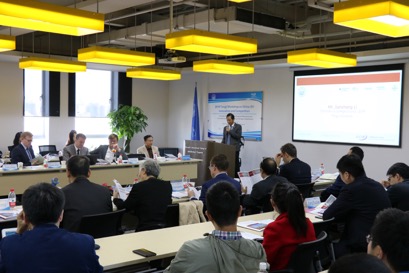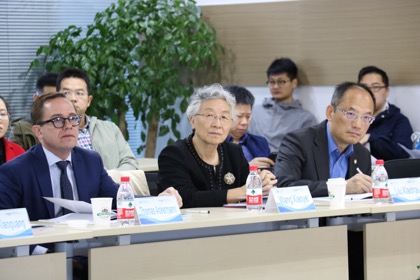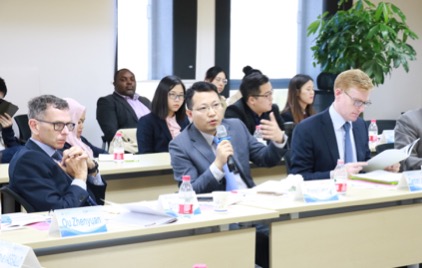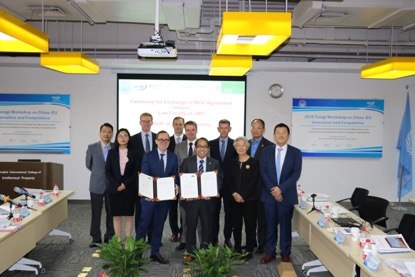October the 26th , 2018, The Workshop on China-EU Innovation and Competition was successfully held at Room 1004, Zhonghe Building by SICIP. The theme of the workshop is “Ten Years’ Enforcement of Chinese Anti-Monopoly Law & Innovation and Competition Policy in the Age of Digitalization”. Senior officials and scholars from University of Munich, University of Zurich, State High Court of Justice, Karlsruhe, Chinese Academy of Social Sciences, Shanghai High People’s Court, KEIS Law firm, Dentons law firm and Fangda law firm were invited to participate in the workshop. Mr. Jianchang Li, Chairman of College Council, SICIP, brought the welcome speech.

Mr. Jianchang Li brought the welcome speech
Dr. Peter Ganea,Deputy Director of Sino-German International Economic Law Institute, Tongji University, moderated the discussion of Session I. Dr. Xiaoye Wang, professor of Chinese Academy of Social Sciences delivered a speech of Ten Years of Chinese Anti-Monopoly Law: Achievement and Challenges, introducing the development of Chinese legislation and challenges we are facing. Dr. Thomas Ackermann, professor of University of Munich gave a lecture of Digital platforms as a challenge to antitrust: Insights from EU and German competition law which put forward several emerging questions base on the digital platform. Dr. Peter Georg Picht, professor of University of Zurich brought speech about Competition Law for the Digital Era - a Selection of Topics and Challenges. He mentioned the digital era brings more complicated cases which were difficult to judge whether competition law should intervene. During the Q&A session, participants discuss about the administrative monopoly and cases based on digital platform in China.

From left: Dr. Thomas Ackermann, Dr. Xiaoye Wang and Prof. Dr. Xiaohai Liu
The second session of the Workshop is about Effective Enforcement of Competition Law, moderated by Associate Professor Xinmiao Yu. Mr. Judge Carsten Lembach from the Higher Regional Court of Karlsruhe gave a speech named Private enforcement of competition law - Quantification of harm in antitrust damages actions. He held that economic evidence can be applied to proving the amount of damage and lump sum can represent a genuine pre-estimate of damages. Mr. Judge Liming Kong from the Shanghai Higher People's Court gave us the report of recent judicial development in China from competition law perspective, focusing on the legal protection of trade secret and anti-trust review of DOE. Dr. Yukun Xiao from University of Munich, gave a speech of Private Enforcement of China’s Anti-Monopoly Law – a Decade in Review. Through the study of judicial practice cases in the past decade, Dr. Xiao analyzed the clarified issues and unsolved issues of the existing legal framework in detail. During the following Q&A session, the participants discuss the future of private enforcement of antitrust law.

From left: Dr. Donato Nitti, Mr. Judge Liming Kong, Mr. Judge Carsten Lembach
Professor. Xiaoguang Shan moderated the third session of the Workshop and the participants focused on the cross cutting issues. At the first, Dr. Matthias Leistner, the professor from University of Munich, gave a lecture of copyright liability of online-content-platforms and recent developments in case law and legislation in Europe, concerning the fundamental alternatives to fairly remunerate authors on the internet. Mr. Hong Yang, the associate professor from the SICIP, delivered a speech of protecting independent elements of works under copyright law and competition law. To illustrate his point, Mr. Hong Yang gave an example of Yong Jin vs. Nan Jiang case to explicate China’s recent practices on this issue. Ms. Caixia Zeng, who comes from Tongji University, made a speech concerning the effect of right to data portability on big data monopoly, under the background of the recently-released GDPR document. She also shared her views on the experiences that China can learn from it. In the Q&A part, Prof. Matthias Leisner and Dr. Peter Ganea raised some in-depth questions on Ms. Caixia Zeng’s speech, discussing the current data protection of individuals in China.

From left: Prof. Dr. Matthias Leistner, Dr. Peter Ganea
The last session of the forum is the Effective Enforcement of Competition Law from Company Perspective. This part was moderated by Prof. Liu Xiaohai, and the speech were given by lawyers with rich experience. Dr. Donato Nitti from KEIS Law, focusing on the artificial intelligence, discussed the question of whether the creation of AI can be treated as the intellectual property from judicial protection. Mr. Jianmin Dai, partner of Dentons, talked about a famous case (“Cainiao” Data Standoff) and then gave a speech about Big Data and Competition in China from a practitioner’s perspective. Mr. Yifeng She, partner of Fangda Partners, compared two similar cases and then he put forward his opinion in the Standard Essential Patent Litigation. Finally, Mr. Xiaofeng Xu from Tongji University, gave a speech in “China-EU Cooperation and Identification of Restrictive Agreements”, in which some defects and suggestions to the improvement of the anti-monopoly Law of the PRC have been introduced.

Cooperation Agreement Exchange Ceremony
During the Workshop, Prof. Dr. Thomas Ackermann and Prof. Dr. Xiaoguang Shan, representing the Law School of University of Munich and SICIP, Tongji University respectively, exchanged cooperation agreement.




